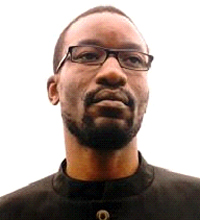It was a few days on from 24th December, the big family celebration!
It was night-time. My father had gone to a party fraternity. My
two eldest brothers had gone to a banga*. At home
were my mother, my other two older brothers and I. Outside, everything
was tranquil.
The city was calm and peaceful. Cold
for a tropical climate. There were no traffic lights -because there
was not enough traffic to justify them. There were no taxis and
very few machimbombos*. The tallest block of flats was four storeys high. It
was some distance from the centre of town. I don’t recall
that any streets had brothels. There was no university. As for escalators,
nobody had ever thought of them. Nobody had even heard that mobile
phones existed. Computers were out of the question. There was no
television and we didn’t listen to the radio much.
We knew about the war from those who
survived, from our dead who were brought back to us, and and the
rest who looked worse for wear. There were also those who were captured
and sentenced before us in public. That usually ended in several
live beatings, after their outpourings of repentance and remorse.
I don’t remember anyone who had been lynched in public. I
do recall, however, worse scenarios; boys forced to maintain sexual
relations with their parents. Fathers forced to beat their own sons.
People’s lips being slit, allegedly so they could laugh forever.
Mothers forced to cut off their brothers’ noses and ears.
Others were subjugated to more complex procedures such as having
their arms and legs cut off.
It was all because of the war. A war
that had other causes!
In this respect it was easy for me
to fabricate repentance. To describe a dream. I don’t know
what for; I never got to see an execution by firing squad. Maybe
because I was a child! I never asked my parents either. Nor anyone
else. I don’t think it was a big thing for me. Of the people
I knew back then I don’t remember anybody my age who had seen
an execution. However, we used to talk about this and much more
all the time.
News was passed on by word of mouth
in the city. This was how we knew who was Minister for Justice,
of the Interior, Education and Culture, and all the rest. This was
how we knew the story of the snake man. This was how we came to
be familiar with various other local tales. This was also how we
missed many international and national events. One day I will take
stock of what has been lost!
As I was saying, night had already
fallen. Some of our immediate family were at home. We were barely
hours away from entering the New Year when the sound of shooting
burst on our eardrums. We’d never experienced anything like
it.
The noises were loud, melancholic and
purposeless. You couldn’t hear the sound of grenades around
our blocks. Nor far from them either. I believe it was the sound
of muzzle loaders from those Russian films interspersed with the
Makarov. Ah! The AKM was definitely there. My favourite weapon!
– My father showed me how to use it before I was 10 years
old. I went on to like it, although I’ve never shot anybody.
That day I wanted to get out the AKM,
which my father kept hidden in the wardrobe. But I wasn’t
in charge of operations. And it wasn’t a serious situation,
either.
We remained calm, as my father had
drilled us. My brothers started to give orders to my mother and
I. I remember we had been told of the reputation that the rebels
would like to have; not that of a group of bandits, as they were
commonly perceived in town. My brothers had learned a lot from the
outpourings of repentance and remorse at the time of the public
sentencing. I understood there and then that this knowledge didn’t
come from school, from Church or from Initiation Rites either.
In a short space of time we came up
with an emergency plan in case we were captured. I don’t remember
having ever had such a clear and concise lesson in my whole life.
That day we didn’t cry. We were steadfast and determined to
live. The screams and shots carried on into the small hours. Nobody
touched the food laid out for the feast. Nobody played on our batuques,
marimbas* and guitars.
It was dawn before our brothers and
my father came home. They were all really cheerful. Happy New Year!
The government had authorised the use of some fireworks for the
New Year celebrations; we just did not know. 
_________________________________
Glossary
*Uma banga - a term for dinner party;
"banga" itself means style, for people who like to dress well in
shiny shoes for example.
*Machimbombos – minibuses for transportation of goods and
people within the city
*Batuques, Marimbas – traditional instruments of the percussion
family

African Potato
I feel my throat
burning
& I cannot
swallow
this drug.
they say
I have
moon sickness.
the
doctor
says he can
cure everything.
but the ones
before me
haven't come back.
the medicine man
said they got better
but no one knows
if they actually died.
meanwhile the West
applauds,
there is progress, they say.
truly,
poverty
decreases
when we poor die.
this is our tragic logic
that’s the way of the
world!
|











![]()
![]()
![]()
![]()


